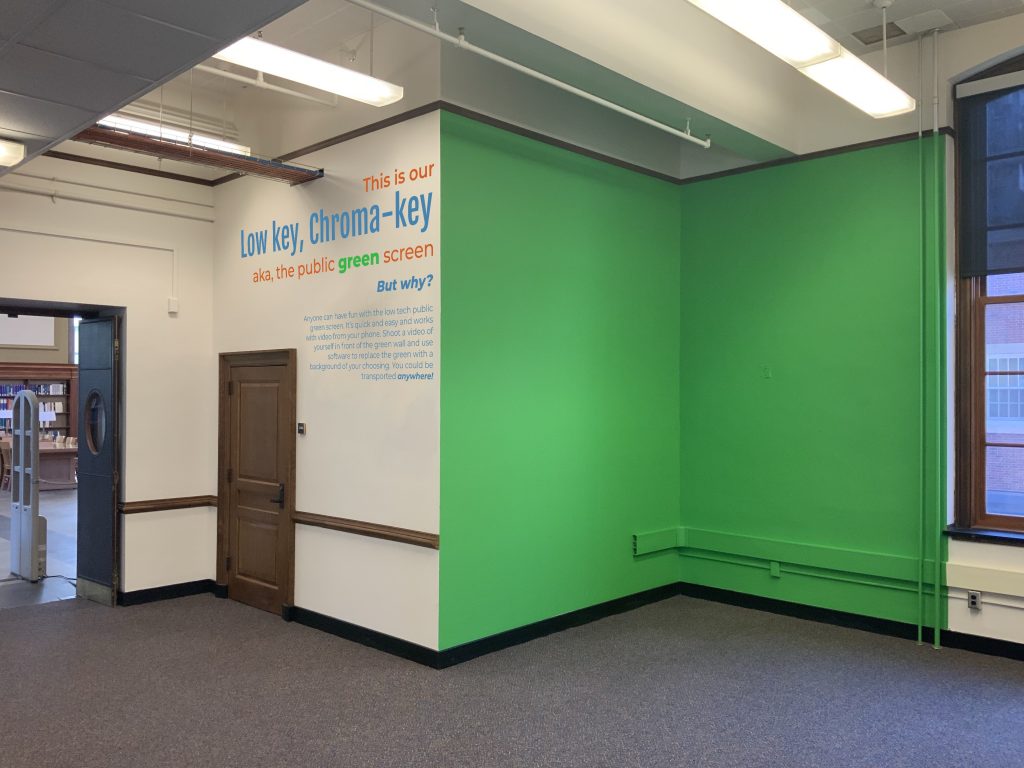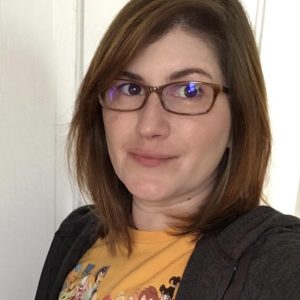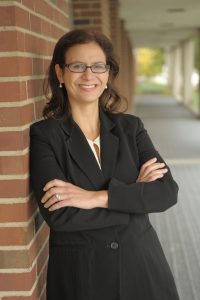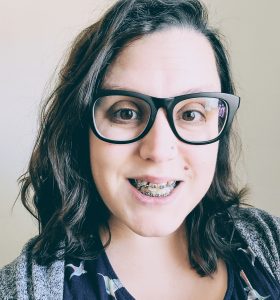The Scholarly Commons is excited to announce we have merged with the Media Commons! Our units have united to provide equitable access to innovative spaces, digital tools, and assistance for media creation, data visualization, and digital storytelling. We launched a new website this summer, and we’re thrilled to announce a new showcase initiative that highlights digital projects created by faculty and students. Please consider submitting your work to be featured on our website or digital displays.
Looking to change up your office hours? Room 220 in the Main Library is a mixed-used space with comfortable seating and access to computers and screen-sharing technology that can be a great spot for holding office hours with students.
Media Spaces
We are excited to announce new media spaces! These spaces are designed for video and audio recordings and equipped to meet different needs depending on the type of production. For quick and simple video projects, Room 220 has a green-screen wall on the southeast side of the room (adjacent to the Reading Room). The space allows anyone to have fun with video editing. You can use your phone to shoot a video of yourself in front of the green wall and use software to replace the green with a background of your choosing to be transported anywhere. No reservations required.

For a sound-isolated media experience, we are also introducing Self-Use Media Studios in Rooms 220 and 306 of the Main Library. These booths will be reservable and are equipped with an M1 Mac Studio computer, two professional microphones, 4K video capture, dual color-corrected monitors, an additional large TV display, and studio-quality speakers. Record a podcast or voiceover, collect interviews or oral histories, capture a video or give a remote stream presentation, and more at the Self-Use Media Studios.
Finally, we are introducing the Video Production Studio in Room 308. This is a high-end media creation studio complete with two 6K cameras, an 4K overhead camera, video inputs for computer-based presentation, professional microphones, studio-lighting, multiple backdrops, and a live-switching video controller for real-time presentation capture or streaming. Additionally, an M1 Mac Studio computer provides plenty of power to enable high-resolution video project editing. The Video Production Studio can be scheduled by arranged appointment and will be operated by Scholarly Commons staff once the space is ready to open.
Stay tuned to our spaces page for more information about reserving these resources.
Loanable Tech
The Scholarly and Media Commons are pleased to announce the re-opening of loanable technology in Room 306 of the Main Library. Members of the UIUC community can borrow items such as cameras, phone chargers, laptops, and more from our loanable technology desk. The loanable technology desk is open 10:30 a.m. – 7:30 p.m. Mondays-Thursdays, 10:30 a.m. – 5:30 p.m. Fridays, and 2-6:30 p.m. on Sundays. Check out the complete list of loanable items for more on the range of technology we provide.
Drop-in Consultation Hours
Drop-in consultations have returned to Room 220. Consultations this semester include:
- GIS with Wenjie Wang – Tuesdays 1 – 3 p.m. in Consultation Room A.
- Copyright with Sara Benson – Tuesdays 11 a.m. – 12 p.m. in Consultation Room A.
- Media and design with JP Goguen – Thursdays 10 a.m. – 12 p.m. in Consultation Room A.
- Data analysis with the Cline Center for Advanced Social Research – Thursdays 1 – 3 p.m. in Consultation Room A.
- Statistical consulting with the Center for Innovation, Technology, and Learning (CITL) – 10 a.m. – 5 p.m. Mondays, Tuesdays, Thursdays, and Fridays, as well as 10 a.m. – 4 p.m. Wednesdays in Consultation Room B.
Finally, a Technology Services help desk has moved into Room 220. They are available 10 a.m. – 5 p.m. Mondays-Fridays to assist patrons with questions about password security, email access, and other technology needs.
Spatial Computing and Immersive Media Studio
Later this fall, we will launch the Spatial Computing and Immersive Media Studio (SCIM Studio) in Grainger Library. SCIM Studio is a black-box space focused on emerging technologies in multimedia and human-centered computing. Equipped with 8K 360 cameras, VR and AR hardware, a 22-channel speaker system, Azure Kinect Depth Cameras, Greenscreen, and a Multi-Camera and display system for Video Capture & Livestreaming, SCIM Studio will cater to researchers and students interested in utilizing the cutting edge of multimedia technology. The Core i9 workstation equipped with Nvidia A6000 48GB GPU will allow for 3D modeling, Computer Vision processing, Virtual Production compositing, Data Visualization/Sonification, and Machine Learning workflows. Please reach out to Jake Metz if you have questions or a project you would like to pursue at the SCIM Studio and keep your eye on our website for launch information.
Have Questions?
Please continue to contact us through email (sc@library.illinois.edu) for any questions about the Scholarly and Media Commons this year. Finally, you can check out the new Scholarly Commons webpage for more information about our services, as well as our staff directory to set up consultations for specific services.
We wish you all a wonderful semester and look forward to seeing you here at the Scholarly and Media Commons!




